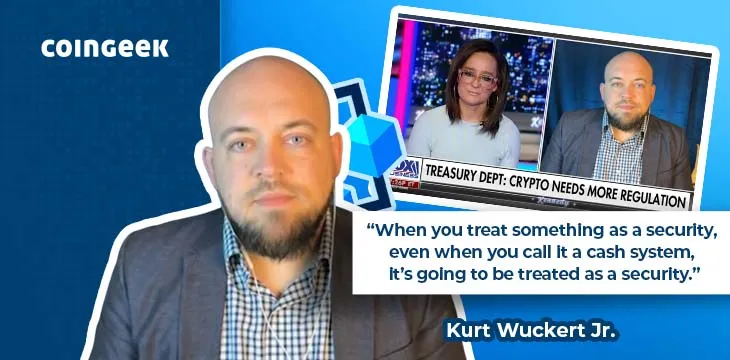|
Getting your Trinity Audio player ready...
|
CoinGeek’s Kurt Wuckert Jr. appeared on ‘Kennedy’ on FOX Business to share his thoughts on the right balance for digital currency regulations.
My thoughts on the right amount of regulation for the blockchain economy in a fun discussion with @KennedyNation last week.
"Terrorism" is a little hyperbolic, but if people are going to use these assets exclusively for asymmetric investments, then they'll be treated that way! pic.twitter.com/ZOP4Xr8UUd
— Kurt Wuckert Jr | GorillaPool.com (@kurtwuckertjr) April 10, 2023
U.S. Department of the Treasury wants to crack down
Kennedy begins by noting that the U.S. Department of the Treasury wants to crack down on digital currency trading. “They never saw a good idea they didn’t want to stick their noses in,” she says, citing a report by the department calling for stricter regulations, including punitive action by several agencies.
Kennedy notes that the report highlights digital currencies being used for money laundering and terrorism but that criminals use cash more often, and nobody is talking about banning that yet. Clearly, she’s not a fan of the U.S. government getting involved in the digital currency space, and she asks Wuckert for his thoughts. She asks, “Is this about terrorism or taking away even more of our freedom to control us?”
Wuckert begins by pointing out that the reason everyone is so mad at ‘crypto’ is because people were misled into believing it was an investment when the focus should always have been on utility. “When you treat something as a security, even when you call it a cash system, it’s going to be treated as a security,” he rightly says.
Pointing out that the industry initially had lots of good ideas about how to disrupt payments companies and create innovative change, Wuckert notes that it has devolved into things like DeFi protocols, and nobody can say whose money theirs is being mixed with inside those protocols. While the extent of it is likely exaggerated, he points out that the data proves there is some degree of mixing funds with North Korean state agents and others.
Kennedy then summarizes what Wuckert has said: banning blockchain assets will only push people into the shadows. He concurs, saying that the war on drugs is an excellent example of how prohibiting things doesn’t work.
Likewise, when you over-regulate something, black markets pop up quickly. Wuckert calls for a balance between doing nothing and overdoing it. He notes that many companies have left the U.S. before due to over-taxation and regulation, and he’d hate to see the blockchain industry thrive elsewhere while the U.S. misses out on all the utility it has to offer.
What about China? Will the government there give up control and let distributed blockchains and the digital currencies that run on them thrive? Wuckert says the Chinese government is very good at pretending to rule with an iron fist. Still, there are a lot of free trade zones, and capitalism is alive and well there—much of the research and development is done by private firms and filters back to the communist party.
Key takeaways from this Kurt Wuckert Jr. interview
- The U.S. Department of the Treasury wants to crack down on digital currencies. In 2022, it released a report citing money laundering and terrorist financing as problems associated with them.
- Wuckert says there’s some truth to this, although some of it is hyperbole. Data has shown that North Korean state actors use DeFi protocols, hack bridges, and more. Ordinary Americans naturally want something done about this.
- However, it’s crucial to get the balance right when it comes to regulation. Too much driving things underground and overseas, and too little allows for the type of free-for-all we’ve seen in the last few years. The trick is to protect innovators and stamp out scammers.
Watch: Blockchain for Digital Transformation of Nations

 07-03-2025
07-03-2025 





